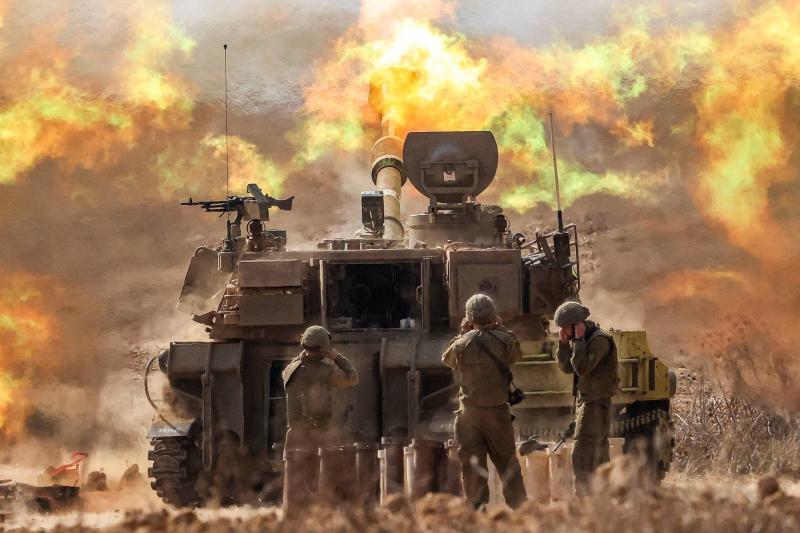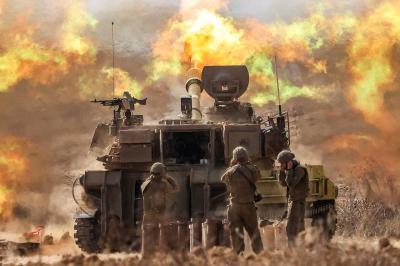Israeli Prime Minister Benjamin Netanyahu announced last weekend that Israel has entered the "second phase" of its war against Hamas in Gaza. In an article published by the British newspaper The Guardian, the writer expressed the belief that the goals of the military campaign have shifted, although the desire to destroy the Hamas movement remains intact. He stated that American pressures and Israeli recognition that a comprehensive ground invasion is a complex operation have led the government to narrow its objectives, possibly to make them more achievable. Instead of naively trying to uproot Hamas from its network of tunnels and hideouts around Gaza, the Israeli army will focus on significantly weakening its military capabilities, according to the article. The author believes that reducing Hamas's ability to produce and launch rockets and shells, as well as to use drones, and ideally eliminating them, will be Israel’s top priorities. Instead of a wide-ranging ground incursion, the Israeli army will reportedly seek to encircle Hamas and exhaust it until the threat it poses to Israeli residential areas is "minimal or manageable."
According to the article, Israeli special forces will carry out raids to gather better intelligence about the "enemy" for use in targeting the leadership of Hamas and its command and control centers. This will be done repeatedly until the leadership is significantly weakened. In this context, a report published by the American Bloomberg website states that Israel's announced strategy of implementing a slow and gradual attack on Gaza threatens a long and deadly war, and the use of extensive tunnels by the Islamic Resistance Movement (Hamas) complicates this campaign. The report, written by Bloomberg correspondent Henry Meyer on economic and governance issues, noted that the military aim of the new long-term Israeli strategy is to minimize the casualties of its army and to reduce human losses to avoid raising further international concern about the humanitarian crisis in Gaza.
### Preparing the Public for a Long-Term Campaign
The report described Israel's ambition to defeat Hamas as larger than ever, stating that the army and government are currently preparing the public for a campaign that will last for months, not weeks. Meyer quoted Yossi Kuperwasser, a former official in Israeli military intelligence, saying, "Israel is proceeding gradually and with extreme caution because it wants to ensure that there are minimal casualties and believes it is not under any time pressure." The writer further noted that the gradual advance of the current campaign aims to avoid fierce fighting in built-up areas, while the forces fear approaching the extensive network of secret tunnels where Hamas hides. The slow tactics may succeed in limiting Israeli military losses and perhaps civilian casualties, but they risk prolonging the war.
### More Than a Year
The report quoted Amir Avivi, a former brigadier general involved in preparations for the Gaza war in 2014, stating that evicting Hamas from Gaza could take over a year. Avivi said after meetings with Prime Minister Netanyahu and senior military officials, as the head of an association of former members and reservists of security forces, "We need to spend months and months dismantling all this infrastructure." He added that the challenge Israel faces in Gaza is exacerbated by the tunneling network, which Hamas claims extends several hundred kilometers and is equipped with ventilation shafts and electricity, some of which goes down to 35 meters, and may contain railway tracks and communication rooms, according to experts. The entrances to these tunnels are often located in residential buildings or other public facilities. He mentioned that using robots to explore the complexities of the tunnels could reduce risks, but due to the narrow spaces, booby traps, and Hamas’s extensive knowledge of the secret environment, Israeli forces attempting to enter would be at a significant disadvantage. Another complication is that Hamas has stated it keeps hostages underground, making bombing the tunnels more perilous.
### The Cost of Blood
The report highlighted that former Israeli Prime Minister Naftali Bennett said on the platform "X": "Hamas depends on our entering every hideout and every tunnel to pay a heavy blood price." He called for a long siege "to suffocate Hamas in the tunnels until they are forced to leave." The writer also quoted Manuel Trajtenberg, director of the National Security Studies Institute in Tel Aviv, saying that due to international and local pressures, Israel would need to scale back the attack after a few weeks and then rely on more targeted missions for an extended period, emphasizing, "At no time do we think about a massive occupation."




